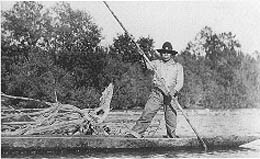In 1916, Arthur C. Ballard (1876-1962) begins collecting the legends of the Duwamish, Muckleshoot, Snoqualmie, and other tribes of Puget Sound, and translates them into English. By interviewing tribal members, he is able to capture the oral traditions and their variations, in the style that they are spoken.
Ballard was born in the precinct of Slaughter (later Auburn) on October 18, 1876. He grew up on his father's farm upstream from the confluence of the Green and White rivers. He was interested in languages and at age 15 he compiled a list of words of the Yakama tribe. In 1899, he graduated from the University of Washington with a degree in Latin. He worked as a teacher, as Auburn City Clerk, and as the secretary for the Azurite Gold Company and Auburn Investment Company.
Skilled in Latin, Greek, German, Spanish, and Esperanto, as well as in the languages of the tribes of Puget Sound, Ballard was well equipped to collect and document local traditions. In the winter of 1911-1912, he contacted Sukwa'lasxt or Big John on the Muckleshoot Reservation, but he was unable to overcome the language barrier. Beginning in 1916, Ballard visited reservations and with the assistance of translators, he began to record traditional stories. His breakthrough came with an introduction to John Xot (Hote), born about 1845. "He knew it all," Ballard stated. Using a special linguistic alphabet, Ballard was able to preserve words in their original form. He meticulously documented his informants and their family histories.
Although not officially an anthropologist, Ballard became recognized as the expert on Puget Sound tribes and traditions and he published works on Native American language and folklore. His most important work, "Mythology of Southern Puget Sound," was published by the University of Washington in December 1929.
At the time of his death in Auburn in 1962, Ballard's Listen My Nephew: Myth, Tradition and History on Southern Puget Sound, was ready for publication, but his family decided not to release the work.

